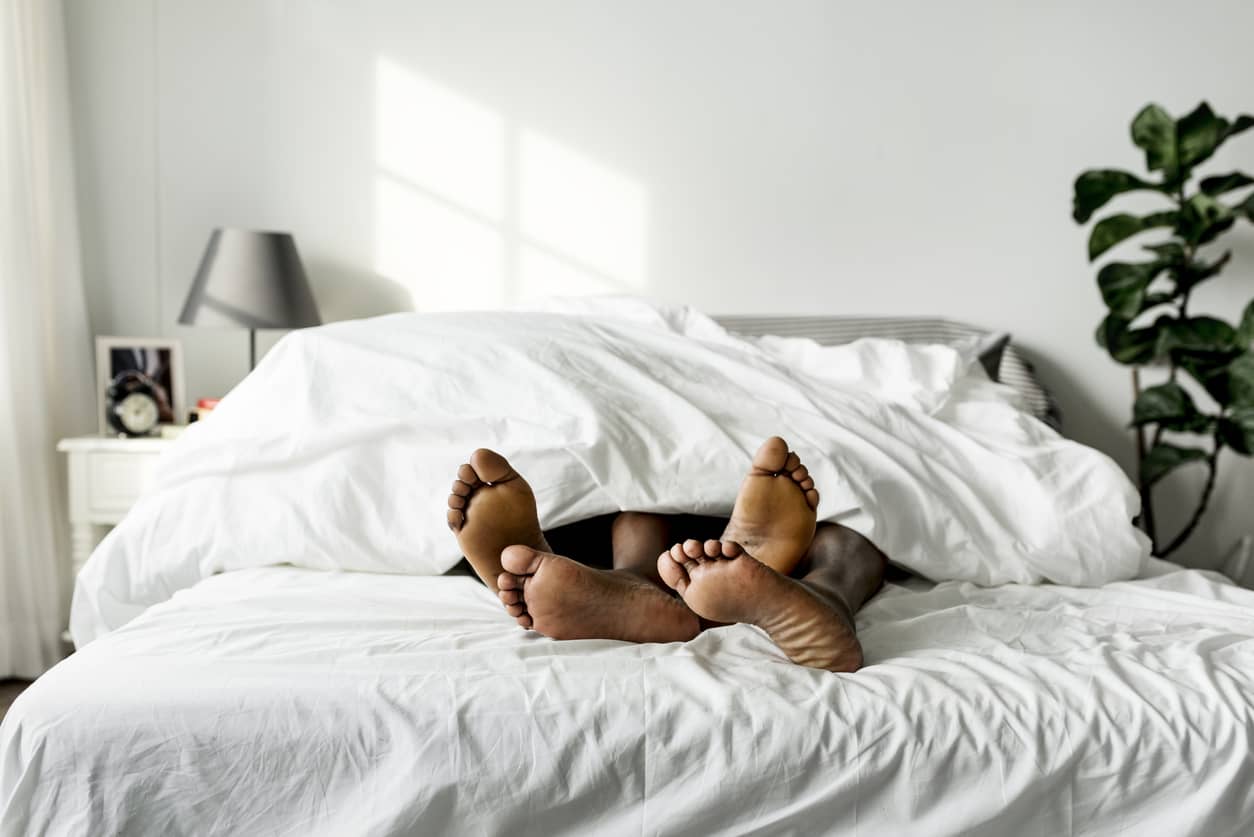What does it mean to have a ‘high sex drive’?
Your sex drive, or libido, is how much you think about and want to have sex. It’s a natural part of being human, which comes from the fact that we need to have sex to have children and survive as a species.
Everyone’s sex drive is different and scientists still don’t fully understand why this is. Sometimes, it’ll be high and you’ll want sex a lot, but at other times, you may lose all interest in it. You may also feel that your sex drive is generally higher or lower than someone else’s. So, it’s hard to define what a ‘high’ or ‘low’ sex drive is – and there really isn’t a ‘normal’.
What is known is that there are many reasons why you may want to have sex more often than usual – and that it’s OK to have a high sex drive. But sometimes, it may be a sign of a mental and emotional problem and you may need help with it.
Read on to discover why your libido may be higher than usual and if you need to speak to a doctor about it.
Why is my sex drive so high lately?
Your sex drive is thought to be affected by 3 main things:
Biology – the amount of sex hormones, such as testosterone and oestrogen, you have in your body. Other hormone changes and physical health problems may also affect this.
Psychology – how you think, feel and deal with things, such as stress. Both mental and physical health problems can also play a role here.
Social factors – your relationships with other people, such as your partner.
Hormonal changes
Your hormones play a big part in your sex drive and changes to them can make them go up or down. The sex hormone testosterone is found in everyone – regardless of sex or gender – and when your testosterone levels go up, it increases your sex drive. They’re usually highest in the morning.
If you have a vagina, you may find you have a high sex drive around ovulation (when an egg is released from an ovary). This is because your testosterone levels are usually at their highest when you ovulate.
If you have a penis, you produce the most testosterone at about age 17 and these levels stay high for a few decades. But after that, your testosterone levels tend to decrease, which may also cause a lower libido – if you have a vagina, your testosterone levels also go down as you age.
Read more about the physical signs of male arousal, what happens when a woman is sexually excited and all you need to know about orgasms.

Pregnancy
Pregnancy can also affect on your sex drive – you may have a higher sex drive in the first 2 trimesters of pregnancy, for example. Read more about having sex while you’re pregnant.
Stress
Stress caused by day-to-day life and difficult events can affect your sex drive. So if you notice you want to have sex more than you normally do, this may simply be because you’re not under any stress at the moment, or you’re using sex to relieve your stress or anxiety. Read more about how stress affects your body.
Alcohol
Drinking alcohol can boost your libido in the short-term because it lowers your inhibitions. But, drinking too much alcohol can have a negative effect on your sex drive, including making it difficult to get or keep an erection, which is called erectile dysfunction, or impotence.
Sleep
Maybe you’re getting more quality sleep than you were before? Getting enough sleep and feeling well-rested can give your sex drive a boost and leads to more energy for sex.
A relationship
Finally, being in a positive, loving relationship can make you want sex more often. You’ll often find your sex drive goes up too when you start a new relationship and everything feels exciting. Discover how to make the most of your sex life.
Should you be worried about your high sex drive?
A high sex drive in itself isn’t usually anything to be concerned about. However, how you behave sexually can occasionally become a problem. If you feel that your sexual activity is constantly ‘out of control’, this can have a negative effect on other areas of your life.
It’s possible that your sexual behaviour is getting out of control if:
- you can’t focus on your normal activities and responsibilities
- you’re neglecting your health and personal care
- you’ve tried to get your sexual urges under control and failed
- you’re never really satisfied by your sexual activities
- it’s affecting your personal relationships
Having a high sex drive may also mean you're at higher risk of getting a sexually transmitted infection (STI) or getting pregnant if you’re having more sex than you usually do, so remember to have safer sex and use contraceptives.

When to see a doctor about a high sex drive
Wanting a lot of sex doesn’t make you a ‘sex addict’. But if you feel that your sexual desires are getting out of control (known as hypersexuality), you may need help.
It could be that you’re using sex as a way to deal with mental and emotional problems, or as a way of coping with other things in your life.
Talking about sexual problems may seem embarrassing. But, as with any mental health problem, there are therapies that can help, so it’s worth speaking to a doctor.
A high sex drive can also be a symptom of some mood disorders such as bipolar disorder. It might be a good idea to talk to a doctor if you also have these symptoms:
- you feel very happy and have lots of energy, ambitious plans and ideas
- you’re spending large amounts of money on things you can't afford and wouldn't normally want
- you don’t feel like eating or sleeping
- people say that you talk very quickly and are hard to understand
These could be signs of the manic phase of bipolar disorder – the depressive phase is when you feel very low or depressed, and you may have a low sex drive too.
Your health questions answered
How do I increase my sex drive?
Answered by: Healthily's medical teamMaking some general lifestyle changes, like exercising more regularly and eating more healthily, can often help to boost your libido. If you’re stressed, mindfulness meditation and exercise may improve your mood, which in turn can help increase your sex drive. Communicating with your partner more openly about sex (and other things) can help your sex life, too. Try to make sure you get enough high-quality sleep and drink less alcohol. But, see a doctor if you’re worried that your mental health or a physical condition is affecting your sex drive. Also, speak to a doctor if you suspect your low libido is because of any medication or contraception you’re using. Read more about how to increase your sex drive.
What kills you sex drive?
Answered by: Healthily's medical teamMany things can reduce your sex drive. Being really tired, relationship problems or stress often affect your sex drive. Then there are hormonal changes from the menopause, pregnancy, giving birth and breastfeeding, or problems like erectile dysfunction, vaginal dryness, painful sex and vaginismus. It may also be affected by underlying health issues such as heart disease, diabetes or an underactive thyroid (hypothyroidism), medicines and contraception you’re taking, and alcohol and drugs. If you’re worried about your low libido, ask a doctor for advice. Read more about the medical causes of a low sex drive.
Key takeaways
- everyone’s sex drive is different and there’s no such thing as ‘normal’
- your sex drive will vary over time and is affected by many things, including biology and lifestyle factors
- having a high sex drive in itself isn’t usually anything to be concerned about
- wanting a lot of sex doesn’t make you a ‘sex addict’, but if you feel that your sexual behaviour is getting out of your control, you may benefit from seeing a doctor
- sometimes, a high sex drive may mean you have a mood disorder like bipolar disorder






